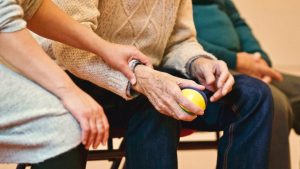SEARCH BLOG POSTS
Healthy Eating When You’re Older
 One of the biggest health issues for seniors is getting adequate nutrition. Even when you have access to shopping and plenty of money, health eating when you’re older isn’t easy. There are a number of statistics that show that malnutrition is prevalent in older people, even in Boise, ID. In fact, some types of low nutrition is often mistaken for dementia.
One of the biggest health issues for seniors is getting adequate nutrition. Even when you have access to shopping and plenty of money, health eating when you’re older isn’t easy. There are a number of statistics that show that malnutrition is prevalent in older people, even in Boise, ID. In fact, some types of low nutrition is often mistaken for dementia.
Making a meal for just one person seems like a waste of time to some.
Often seniors living alone simply don’t want to take the time to create a complete meal for themselves. One solution is to have healthy food already made and frozen in individual portions or have fresh fruit and vegetables cut up and ready for consumption to graze on all day long. Dental issues, a meager budget, digestive issues and food intolerance also add to the difficulty of eating healthy. Buying in-season fruits and vegetables, preparing several meals at once and freezing them and careful planning can help overcome those problems. Nothing is healthier and easier to make and eat than a smoothie made with lots of fruits and vegetables, plus protein powder.
Packaged foods are so much easier, but not necessarily healthier.
A pot pie or TV dinner might seem like a great alternative to cooking, but you won’t get all the nutrition you need. There are options. For those chilly winter months, making soup not only adds warmth and moisture to the air, it also provides quite a few meals for a low price. Using bones to create the broth also adds collagen to your diet. One recipe even shows using the bones from rotisserie chicken from the grocery to make bone broth. You can make the broth ahead and when you find you have too many vegetables cut up or left over, take out a bag of broth and make soup! It’s a way to stop waste while eating healthy. Add a side salad and some fruit for dessert and you have a nutritious meal.
Has the rush to put on sun block created a vitamin D shortage in older adults?
There are estimates that a high percentage of seniors suffer from vitamin D deficiency. While it’s easy to understand in our areas during the winter, it shouldn’t occur at other times. The sun is a free and natural source for the vitamin. Smart sunning should be part of everyone’s day. The ultraviolet rays are converted to vitamin D by the body. As people age, the amount converted is reduced by approximately 70 %. Muscle weakness, bone pain and fractures are a few of the results from a vitamin D deficiency.
- Protein is important every day, just as fruit, vegetables, grain products and dairy. No matter what your age, your plate should be a rainbow of colors which include green, red, yellow, orange, purple and white.
- If you want better digestion and healthier digestive tract, exercise. Getting adequate exercise not only increases energy levels, it helps create a friendlier host of digestive microbes.
- Adequate hydration is often a problem with seniors. Seniors dehydrate faster than others. Dehydration can lead to rapid heart rate, lethargy, cramps, muscle weakness and confusion that resembles dementia.
- If you have a senior relative on your Christmas list, give them a gift of homemade food. When you make up your own food, create an extra plate each meal and freeze it. You’ll have several to gift at Christmas.
